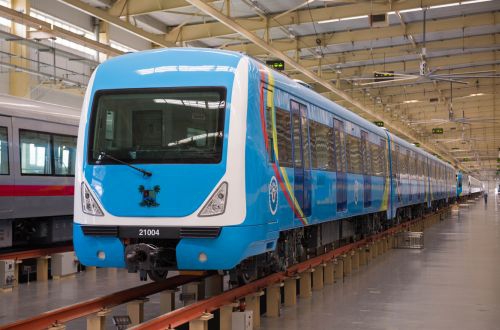The signing ceremony took place during the France-Nigeria Business Forum being held in Lagos and attended by the French president, Mr Emmanuel Macron, and Mr Akinwunmi Ambode, executive governor of Lagos State.
The 27km Blue Line will run from Marina via National Theatre and Mile 2 to Okokmaiko in the west. Phase 1 is 8km long and comprises the section from National Theatre to Mile 2 with four stations. According to local press reports this section is 98% complete. Phase 2 covers the 4km section with three stations from National Theatre across Lagos Lagoon to Marina.
For phase 1, Alstom will electrify the section between National Theatre and Iganmu at 750V dc third rail and provide substations. Under phase 2, Alstom and Lagos state government will work to secure funding from export credit agencies to procure additional metro trains, install CBTC-based signalling, and provide an operation and control centre, passenger information system and fare collection.
CRRC’s Dalian Locomotive and Rolling Stock subsidiary has already built a fleet of 15 trains for phase one. The Chinese trains were completed in 2016 as it was expected that the first phase would open in December 2016. Lamata originally planned to use refurbish former Toronto metro trains but this plan was dropped in favour of new trains.
Once the contract between Alstom and Lamata has been signed, which is expected to take place before the end of July, phase 1 is expected to take 18 months to complete. This includes demonstration of train operation by Lamata. “Entry into service of the Blue Line will depend on the construction of phase 2, which is under investigation,” Alstom told IRJ. “The ambition will be to launch commercial service by mid-2022, assuming that the contract for phase 2 with the associated financing is put in place by mid-2019.”
Lagos has a population of 22 million and suffers from severe road traffic congestion. The Blue Line is expected to carry 400,000 passengers per day initially, rising to 700,000 passengers when the line is completed.
“The Blue Line project is of strategic importance for the city of Lagos as it allows our people to travel safe and fast across longer distances,” says Eng Abiodun Dabiri, managing director of Lamata. “The integration with existing transport systems like our bus or boat lines, and future metro lines will largely contribute to our global transport plan for Lagos to reduce traffic congestion and make Lagos a smart city.”

